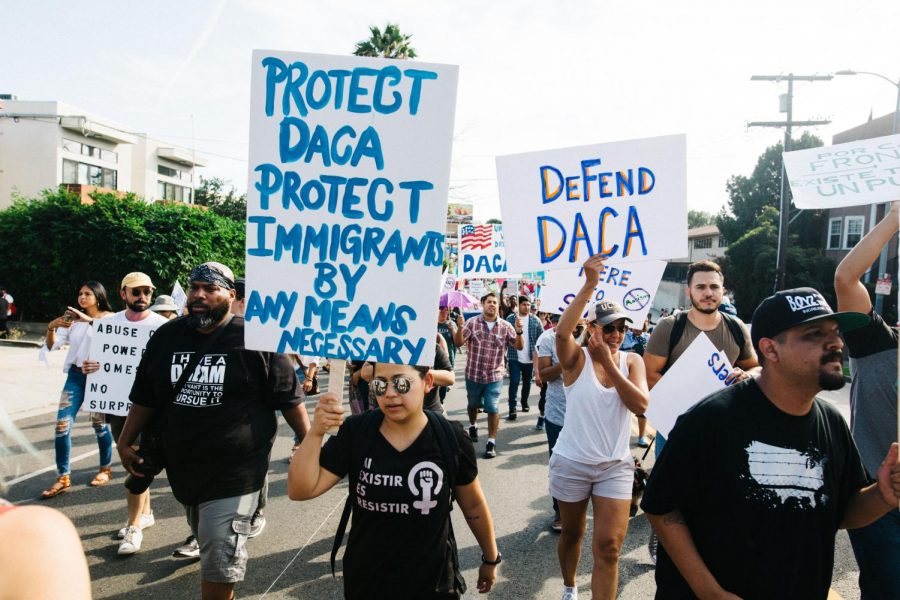Faculty rally for DACA students after Arizona Supreme Court Ruling restricts in-state tuition rates
September 6, 2018
In April the Arizona Supreme Court ruled to deny in-state tuition to DACA students.
At least one organization is taking action in order to help alleviate the financial toll this will take on many community college students.
The Maricopa Community College Faculty Foundation is a non-profit organization that does not rely on government aid, but donations. The organization does not have some of the typical requirements that some scholarships need and they do not require a high GPA.
The Maricopa County Community College District in June voted 4-3 to appeal the ruling that denied in-state tuition.
The matter will now be before the U.S. Supreme Court.
In a June article written by Anne Ryman from The Arizona Republic— Ryman noted a divide on the appeal vote by the Maricopa Board.
Board member, Linda Thor was for the appeal and Tracy Livingston was not.
“Not all members agreed with the board’s decision to appeal,” Ryman wrote.
Board member Thor, indicated that her father was an immigrant, and was in favor of the vote to appeal.
“I feel we have a moral and ethical responsibility to our students,” Thor said.
Board member Tracy Livingston who voted against the appeal wanted the students to understand that as she was sympathetic to what they are asking—but was not going against a law that was passed several years ago by Arizona voters.
“We not only represent you, we represent the citizens of the state as taxpayers,” Livingston said.
Aid is Available
In 2007 the Maricopa Community College Faculty Foundation was established from the Maricopa Community College Faculty Association.
It was created for the students that have small financial bumps or issues that arise— for any student—issues that would be a struggle to afford.
Dr. Barry Vaughan is the president of the MCCFF organization created for this type of student help.
Vaughan explained that once the board members and faculty observed this niche of students that struggle to afford books or education services and with no resources for aid—the students would end up dropping out of college or having to sacrifice every day necessities in order to afford school.
Once this problem came to their attention they formed a way to help students.
“When we established our charity it was primarily focused on those kind of emergency situations that the larger foundation wasn’t able to meet.” Vaughan said.
This was created to help the student who is working and having to meet the deadlines of enrolling on their own and are working part time or full time and having to rely on limited funds.
For many DACA students this struggle—to cope with day to day expenses—has been intensified and is even more challenging as the amount per credit hour that they have to pay has gone from $85 dollars per credit hour (in state-tuition cost) to $401 per credit hour without the in-state status.
The DACA Success Grant was created after the Arizona Supreme Court made the decision that denies DACA students in-state tuition. This grant is made with the intent to pay for the balance of tuition that the students would have to pay on their own.
The Faculty Foundation Success Grant statement reads…
Responding to what they see as a moral obligation to help students, the Maricopa Colleges Faculty Foundation, the 501c3 charity of the Maricopa Colleges Faculty Association, decided to extend their longstanding emergency grant program to DACA students, too. The Faculty Foundation created the “DACA Success Grant” to help qualified students bridge the difference between in-state tuition and the court mandated out-of-state tuition. And, most importantly, DACA students will be able to stay in school and continue their education. Since the beginning of July when the Foundation began the “DACA Success Grant” program they received over 60 applications.
DACA Students who wish to apply for a DACA Success Grant should go to the Foundations web site, MCFF.org, where more information about the grant program and the grant application form is available.
The Faculty Foundation is also in discussions with Chicanos Por La Causa to help bring together the Foundations of other Arizona public colleges and universities to provide support for DACA students statewide. While the discussions have been very fruitful, it is difficult to get needed funding into the pipeline soon enough for DACA students at the start of the fall semester without additional help from the community.
The MCCFF grant program pays the difference of the tuition that ends up being more than half that the student has to pay. The grants are requested by a faculty staff member and from there the Faculty Foundation is contacted for the immediate financial help for the student.
“In this case, we are writing the check to the institution,” Vaughan said, “It will operate like a scholarship and if they complete at the end of the semester, that is now applied toward their account.”
In the DACA Grant applications report the applications received and those that have been awarded are less than 25%.
There is a surplus in demand and these organizations are reaching out to every corner of Arizona and are making a difference.


